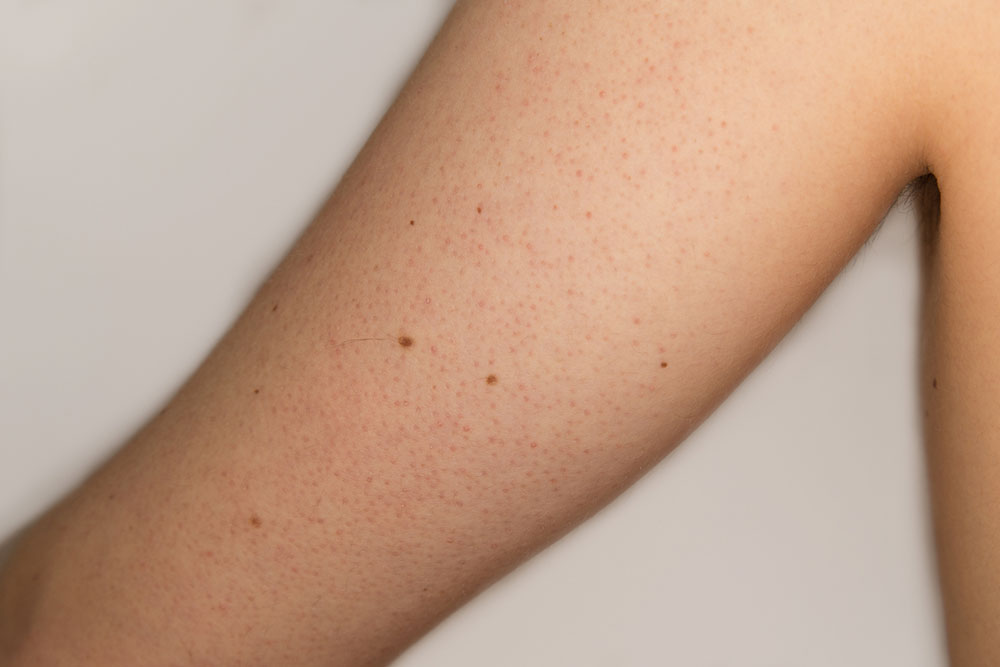Top Treatment Options for Keratosis Pilaris
Keratosis pilaris is a general, harmless skin ailment that causes small and hard bumps on the skin, making it feel like sandpaper. These light-colored bumps appear on the upper arms, thighs, and buttocks and are sometimes accompanied by redness or swelling. These bumps might show up on an individual’s face, but it is an infrequent phenomenon. Many children and teens are prone to keratosis pilaris and feel an itchy sensation.

People with dry skin are more prone to keratosis pilaris. The surface can get worse in winter when there is less moisture in the air. Here are a few things one can opt for keratosis pilaris treatment.
Omega-3
Food rich in omega-3 help in keeping your skin moisturized and healthy. Walnuts, flaxseeds, salmon, tuna, sardines, and soybeans are rich sources of omega-3. For overall skin, health and function include leafy vegetables and greens to your daily diet. Certain foods are known to worsen the condition; dairy products can trigger inflammation, which can trigger conditions like keratosis pilaris.
Fragrance-free Body Products
Fragranced body products like lotions, creams, and perfume sprays, using scented soaps and body washes can exacerbate keratosis pilaris. Use products and follow a body-care regimen that is fragrance-free. Also, do not shower with hot water. Instead, use luke-warm water for bathing. Minimize skin dehydration by keeping bath time short, i.e, under seven minutes.
Keratolytic Agents
These agents help remove the scales that block the follicles and cause the formation of bumps. Products containing lactic acid, urea, and glycerin can help you achieve desired results and can be administered daily to counter and treat the condition. Most lotions and creams containing keratolytic agents are gentle on the skin and hence, can be used for sensitive skin that gets irritated easily. However, before applying any cream do consult your dermatologist to avoid further complication.
Chemical Exfoliant
A chemical exfoliant that eliminates dead skin cells can be your savior and is the best option as they unclog follicles. Specific products also have moisturizing properties and using them would not only remove the dead skin but also moisturize your live skin, which is essential for keratosis pilaris treatment. One needs to practice the regimen on a daily basis.
Prescription Retinoids
Prescription retinoids like Retin-A are used to treat acne. Vitamin A derivative’s exfoliating powers allows the younger skin to develop faster, and the chicken skin bumps flatten out. Retinoids take several weeks to act before one can see results.
There are other types of treatment as well that help. There are products that can go directly to the affected skin to improve keratosis pilaris.
Topical Exfoliants
Products that contain alpha-hydroxy acid, lactic acid, salicylic acid, or urea and help remove dead skin cells are very useful for the treatment of keratosis pilaris. These products are not recommended for children as they might cause redness or a slight burning sensation.
Topical Retinoids
Retinoids related to vitamin A help prevents hair follicles from getting plugged. Tretinoin, Avita, Renova, and Retin-A and tazarotene, average and Tazorac are commonly included ingredients in these products. Topical retinoids might irritate your skin, causing redness or peeling. Pregnant women or nursing mothers must avoid topical retinoids.
Laser Treatment
Severe redness and inflammation due to keratosis pilaris can be treated with the help of laser treatments. There is no study proving the efficiency of this treatment, but one can opt for the method if other creams and lotions are not able to help you with getting any relief. However, one might need several sessions of this treatment for keratosis pilaris to see any results.
Certain simple things that can help keep your skin comfortable.
- Do not scratch the bumps or rub your skin roughly
- Use lukewarm water alternatively than hot water for bathing or showering
- Do not stay in the water for an extended period
- Use soap that has fat or oil in it. Sulfur soaps are also known to help with Keratosis pilaris
- Use thick coats of moisturizers and generously apply them on your skin
- Add moisture to the air by using a humidifier
As there is no permanent keratosis pilaris treatment, creams and lotions are one’s best option for reducing the effects. Do not let the ailment rule your life as it is understood to feel unhappy and upset about these bumps on your skin but remembers no one is perfect and the bumps would flatten out eventually. Patience and treating your skin right will accelerate the healing process and remove the plugs from your skin making it beautiful and subtle.


